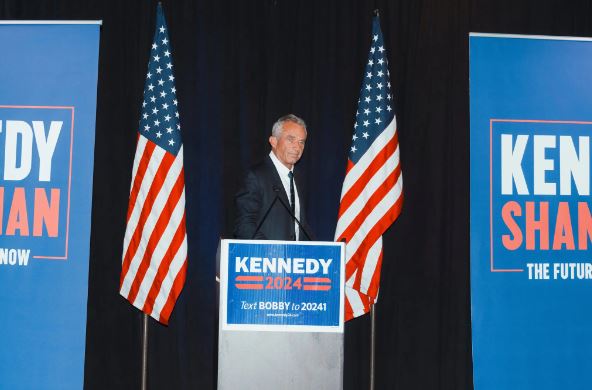Robert F. Kennedy Jr.’s presidential campaign raised just $2.6 million in May, a modest amount that highlights the campaign’s growing dependence on his affluent running mate, Silicon Valley lawyer Nicole Shanahan. This figure represents the smallest monthly sum raised by the Kennedy campaign in 2024, according to the latest filings with the Federal Election Commission. The reduced funding in May can be attributed to the minimal financial contribution from Ms. Shanahan during that month, despite her substantial previous investments.
Ms. Shanahan, who has injected millions into the independent presidential campaign, significantly boosted the campaign’s finances earlier in the year. In April, the Kennedy campaign raised $10.7 million, with $8 million coming from Shanahan. Following her announcement as Kennedy’s running mate in March, she promptly contributed $2 million. However, her contributions in May were significantly lower, impacting the overall fundraising efforts.
At the end of May, the Kennedy campaign had $6.4 million on hand. This figure, however, does not fully reflect the campaign’s financial standing, given the potential for Ms. Shanahan to infuse additional funds at any moment. While campaign finance laws restrict individual donations to a maximum of $3,300, candidates themselves can contribute unlimited amounts to their campaigns. Ms. Shanahan, a philanthropist with access to over $1 billion, has yet to indicate any limit to her financial support.
Kennedy’s campaign faces unique financial challenges, particularly concerning ballot-access work, which is notably costly. In May, the campaign spent approximately $6.3 million, nearly half of which was funneled through a limited liability company specializing in ballot access. These expenditures, labeled as “campaign consulting,” obscure the precise nature of the campaign’s spending.
Ms. Shanahan’s background adds a complex layer to the campaign’s narrative. Once married to Google co-founder Sergey Brin, her wealth and influence have been critical to sustaining Kennedy’s bid. Her initial and substantial financial support underscored her commitment to the campaign, making her recent limited contributions in May particularly notable.
The campaign’s reliance on Ms. Shanahan raises questions about its sustainability and financial strategy. While her potential for future contributions offers a safety net, the campaign’s dependency on a single donor poses risks, especially if she decides to curtail her financial involvement.
Kennedy’s campaign strategy includes significant investments in securing ballot access across states, a process essential for the viability of an independent presidential bid. This effort involves navigating complex legal requirements and ensuring compliance, which incurs substantial costs. The campaign’s expenditure on ballot access illustrates a commitment to a nationwide presence, yet it also highlights the financial strain of such an undertaking.
The transparency of Kennedy’s campaign spending has come under scrutiny due to the vague categorization of expenses as “campaign consulting.” This lack of clarity raises concerns about the actual allocation of funds and the efficiency of the campaign’s financial management. Such opacity can affect donor confidence and public perception, potentially impacting future fundraising efforts.
In conclusion, Robert F. Kennedy Jr.’s campaign faces significant financial challenges, exacerbated by its heavy reliance on Nicole Shanahan’s contributions. While her wealth provides a crucial financial lifeline, the campaign must navigate the uncertainties associated with such dependency. With substantial expenses related to ballot access and the ambiguous nature of some expenditures, the campaign’s financial strategy and transparency will be critical factors in its ongoing viability. As the election progresses, Kennedy’s ability to secure and manage funds effectively will be pivotal in maintaining his candidacy and achieving his political objectives.

